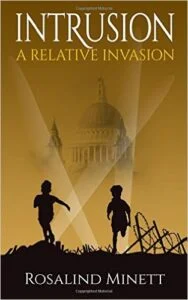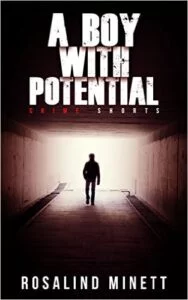
Rosalind Minett
Today in our #WritersWednesday slot about writing, British indie author and chartered psychologist Rosalind Minett explains her approach to revising her work, sharing an interesting and unusual tip about her preferred workplace!
A Comforting Thought
One of my best buys ever has been a memory foam mattress. Comfortable to get into at night, by the time morning has come it has memorised your body so well that invisible hands seem to support your entire length aloft, as in a flotation chamber. This experience makes it extremely difficult to get up. I respond by doing my concept revision before starting the day.
What is Concept Revision?

The first in Rosalind Minett's trilogy of World War II novels
Concept revision is what I call the process of thinking over recent writing, especially any sense of weakness or inadequacy. This also involves the ‘why am I writing this anyway' thought, the stage where the story may be worked out or well on its way but the theme hasn't really become evident. Or it may be that I know there's insufficient depth in a chapter. It may be functional, in that it moves the story in the right direction, but it will fail to satisfy the reader. I like to write one thing and for it to have meaning for the future narrative, or better still, for it to have resonance on several levels.
Examples of Concept Revision in Action
As an example, I have two comfortable characters and they serve the purpose of providing emotional stability to the protagonist, but that isn't enough. I had the cosy chapter, now I had to insert some added germ of mystery. It only took one sentence, but this was to lead to a little piece of back story to the cosiness, which could come into a later chapter and add reason/depth to the cosiness.
Other times, I have struggled with functional chapters, and they have only come right as result of thinking it over while relaxed. I needed a slightly dire act to explain my protagonist's anger at his partner and to supply a new chapter. An ironic and rather nasty gift came to mind as the perfect means – but only after I'd been prone for twenty minutes after the clock struck.
The Difference Between Revising and Editing

The first in Rosalind Minett's Crime Shorts series
I'm sure I'm not the only writer who spends as much time editing as in creating the story. Revising your work seems often bogged down by this, but searching for a theme that underlies your story – the reason that unconsciously made you choose to write this particular one – is something that perhaps comes later in the journey. Possibly for some, it comes too late, for the publish button has already been pressed.
I thank my mattress for making this concept revision quite a pleasant experience rather than an agonised one sitting at the desk. At that point I should be writing, not reflecting. And now I am.
OVER TO YOU Do you consciously carry out concept revision, or does is it part of your editing process? Where do you prefer to work when not at your writing desk? We'd love to know!
RELATED POSTS
Are you a plotter or a pantser? – Rosalind Minett is one of the panellists in the #IAF16 debate, which you can still watch here
Different kinds of editing for self-publishing authors – by Tahlia Newland
What is creative writing? – by Orna Ross





[…] Writing: What is Concept Revision and How and Why Should You Do It? by Rosalind Minett in Advice: Wr… […]
[…] After writing the first draft, do you revise or do you edit? What is Concept Revision and How and Why should you do it […]
[…] Rosalind Minett Today in our #WritersWednesday slot about writing, British indie author and chartered psychologist […]
Mmm – have memory foam mattress but have not found it seduces me to remain doing writing stuff … maybe I am not giving it enough attention on waking (I have done Mindfulness lying there, I admit!) Seriously, yes, I love doing this to a story in progress: concept and editing … will be interesting to see if they can be untangled. I tend to edit a fair bit as I go along, in terms of telling-the-story-edit, as opposed to copy-edit …
It is fun to work on a pre-existing text, one which you’ve authored yourself after all … improving the shining typescript … (as in Alice, ‘How Doth the Little Crocodile rhyme.)
[…] Writing: What is Concept Revision and How and Why Should You Do It? by Rosalind Minett in Advice: Wr… […]
Sounded at the start that Rosalind was talking about revising non-fiction, but it turned out she was talking about fiction. Best to tells us the genre first.
I do both; and it depends what I’m working on. If I need to multitask I like to use two or three monitors. In that case: desk. But if it’s editing/revising, I’m usually in the sofa with at least three animals cozied up to me, which makes the job more tolerable. Let’s be honest, writing is way more fun! When I write scenes initially it helps me so much more to visualize writing with a nice fountain pen, in a nice notebook. Under a tree, on a terrace with a cuppa or a carafe of wine, in bed… preferably away from the computer. Thank you!
I prefer a long walk or doing a jigsaw or knitting or any other activity where part of my mind is engaged! But I agree, a piece of fiction is way deeper and stronger when you spend time thinking about what you’ve written. I like to pants my way through a first draft on a very vague outline, then do the thinking, then rewrite.
Good advice – now I just need to buy a new mattress.